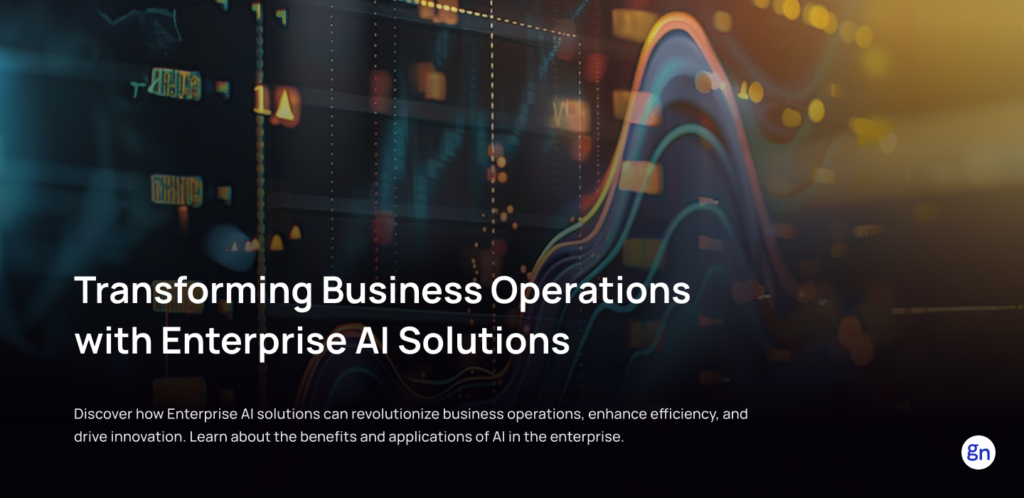
In the fast-paced world of business, staying ahead of the competition requires more than just traditional methods. Enterprise AI solutions are revolutionizing business operations by enhancing efficiency, driving innovation, and delivering actionable insights. This blog explores how enterprise AI solutions are transforming businesses and the benefits they bring.
Understanding Enterprise AI Solutions
Definition and Core Concepts
Enterprise AI solutions involve the integration of artificial intelligence technologies into business operations to improve processes, decision-making, and outcomes. These solutions leverage machine learning, natural language processing (NLP), and other AI technologies to analyze data, automate tasks, and provide predictive insights.
Key Technologies in Enterprise AI
- Machine Learning (ML): Enables systems to learn from data and improve performance over time.
- Natural Language Processing (NLP): Facilitates the interaction between computers and humans using natural language.
- Computer Vision: Allows systems to interpret and make decisions based on visual inputs.
- Robotic Process Automation (RPA): Automates repetitive tasks to improve efficiency.
Benefits of Enterprise AI Solutions
- Enhanced Decision-Making
Enterprise AI solutions provide data-driven insights that enhance decision-making processes. By analyzing vast amounts of data, AI systems can identify patterns and trends that may not be apparent to human analysts. These insights enable businesses to make informed decisions quickly and accurately.
- Increased Efficiency
AI-powered automation tools streamline business processes, reducing the need for manual intervention. This automation increases efficiency, minimizes errors, and frees up employees to focus on higher-value tasks. For instance, RPA can handle routine tasks such as data entry, invoice processing, and customer support.
- Improved Customer Experience
AI solutions personalize customer interactions by analyzing customer data and predicting needs. NLP-powered chatbots and virtual assistants provide instant support, enhancing customer satisfaction. Additionally, AI-driven recommendation systems offer personalized product and service suggestions, increasing engagement and sales.
- Cost Reduction
By automating tasks and optimizing operations, enterprise AI solutions reduce operational costs. These savings can be reinvested into other areas of the business, driving growth and innovation. Predictive maintenance, for example, helps businesses avoid costly equipment failures by identifying issues before they become critical.
Applications of Enterprise AI Solutions
- Predictive Analytics
Predictive analytics uses machine learning algorithms to forecast future trends based on historical data. Businesses use predictive analytics for demand forecasting, risk management, and customer behavior prediction. For instance, retailers can predict inventory needs to avoid stockouts and overstock situations.
- Supply Chain Optimization
AI solutions optimize supply chain operations by analyzing data from various sources, including suppliers, logistics, and market trends. This optimization improves inventory management, reduces transportation costs, and enhances overall supply chain efficiency.
- Fraud Detection
AI-powered systems detect fraudulent activities by analyzing transaction data and identifying anomalies. Financial institutions use these systems to protect against fraud and ensure secure transactions. Machine learning models continuously improve their accuracy by learning from new data.
- Human Resources Management
AI solutions streamline HR processes such as recruitment, employee onboarding, and performance management. AI-driven tools analyze resumes, match candidates with job requirements, and provide insights into employee performance and engagement.
Implementing Enterprise AI Solutions
- Identifying Business Needs
The first step in implementing AI solutions is identifying specific business needs and goals. This involves understanding the areas where AI can have the most significant impact and defining clear objectives.
- Choosing the Right Technology
Selecting the appropriate AI technologies based on business needs is crucial. Whether it’s machine learning, NLP, or computer vision, the chosen technology should align with the company’s goals and capabilities.
- Data Preparation
AI solutions rely on high-quality data. Data preparation involves collecting, cleaning, and organizing data to ensure it is accurate and relevant. This step is critical for the success of AI initiatives.
- Partnering with AI Experts
Collaborating with AI experts and consulting firms, such as Global Nodes, can help businesses navigate the complexities of AI implementation. These experts provide valuable insights, technical expertise, and support throughout the AI adoption process.
Future Trends in Enterprise AI Solutions
- AI-Driven Innovation
As AI technologies continue to evolve, they will drive innovation across various industries. Businesses will leverage AI to develop new products, services, and business models, staying ahead of the competition.
- Integration with IoT
The integration of AI with the Internet of Things (IoT) will enable real-time data processing and decision-making. This convergence will enhance operational efficiency and provide deeper insights into business operations.
- Enhanced Data Security
AI solutions will play a crucial role in enhancing data security by detecting and mitigating cyber threats. AI-driven security systems will analyze network traffic, identify vulnerabilities, and respond to threats in real-time.
Conclusion
Enterprise AI solutions are transforming business operations by enhancing decision-making, increasing efficiency, improving customer experiences, and reducing costs. By understanding the benefits and applications of AI, businesses can harness its power to drive innovation and achieve long-term success. Partnering with experts like Global Nodes ensures a smooth transition to AI-driven operations, maximizing the potential of enterprise AI solutions.


